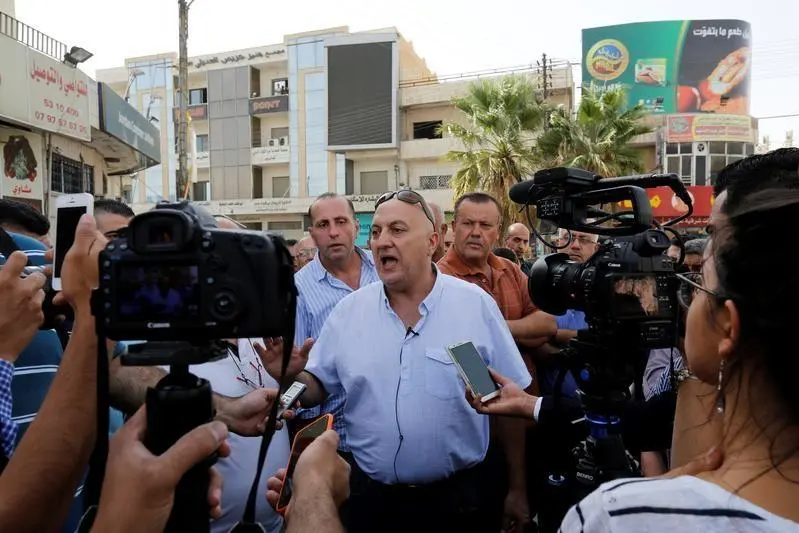PHOTO
Veteran journalist criticises state of media in Kingdom, says last three years have been worst for sector
By Suzanna Goussous
AMMAN — Jordan was the third country to sign the “Declaration on Media Freedom in the Arab World” on Wednesday to guarantee freedom of expression within regulations.
The declaration is a commitment to the primary values of freedom of media in the region, professional journalism and access to information, Jordan Press Association (JPA) President Tareq Momani said.
The declaration was first signed by Palestine in August, followed by Tunisia.
It covers several angles, including freedom of access to information, freedom of expression, equality among journalists, regulation of print newspapers, reform of the media law, countering hate speech and intolerance, and ensuring the safety of journalists.
“By signing the declaration today, we are setting hopes and plans that this statement would fight hate speech,” Momani said.
However, the JPA president expressed opposition to Article 10, which states that the government “does not have the power to determine who is a journalist, it is not allowed to set official or legal restrictions on journalists”.
The article contradicts the JPA’s values and regulations and the Publications Law, Momani said.
The law defines journalists as members of the JPA.
Article 10-B states that journalists have the right to choose their association or union, according to their demands and benefits, which also contradicts the laws set by the association, Momani said.
“We want to scrap the laws that take away journalists’ freedoms in publications, such as imprisoning or detaining journalists… We are working with the government on this issue and we are on the right track,” he said.
Government Spokesperson and Minister of State for Media Affairs and Communications Mohammad Momani said that press freedom is a key feature of the country and that the government is responsible for protecting journalists.
“We believe in concepts beyond the freedom of journalists; we believe freedom of expression is a primary part of Jordanian national security,” he added.
Officials are working to develop press and publication laws in regards to media freedom to overcome the challenges facing journalists, the minister said.
“Freedom does not mean chaos… There should be some restrictions to maintain the professionalism of journalism,” he added.
Jim Boumelha, the president of the International Federation of Journalists (IFJ), said over the past 25 years, 2,300 journalists have been killed.
“One of the worst things that journalists today face is death. The killing of journalists has become one of the main features of what is happening around the world… the [IFJ] has been for 25 years monitoring the killing of journalists,” he added.
‘Worst years for journalism’
At a discussion organised by the JPA and the Friedrich-Ebert-Stiftung, Government Coordinator for Human Rights Basel Tarawneh said the declaration would advance the media system in Jordan and protect journalists’ rights in the Kingdom.
Meanwhile, Rana Sabbagh, the executive director of Arab Reporters for Investigative Journalism, said the past three years had been the worst for media in Jordan and the region.
“During my 33-year career in journalism, I can say the last three years have been the worst… After the Arab Spring erupted, followed by the Egyptian uprising in 2013, Arab journalists followed the lead of Egypt,” Sabbagh, a former chief editor of The Jordan Times, said.
“Nowadays, the first step to reporting an incident is for journalists to identify their political views. No one is allowed to be neutral. It is not allowed to report the news as is or to highlight issues in society,” she argued.
Sabbagh said that since the Jordan Media Commission was founded two years ago, around 17 gag orders were issued banning coverage of cases, including the death of the Jordanian sisters Soraya and Jumana Salti, the attack on the General Intelligence Department office in Ain Al Basha and the assassination of Jordanian writer Nahed Hattar.
“We are not allowed to have access to information; we are not allowed to know what happened to those cases,” she said.
Media outlets, Sabbagh added, are made of the same “template” with restrictions on their coverage of issues; meanwhile on social media networks, there is chaos when it comes to expressing opinions.
“There is a worldwide problem in media and maintaining high-quality journalism and e-reporting… But what matters eventually is the content of newspapers,” she added.
“According to a study conducted in 2009, the majority of Jordanian journalists are above the age of 40, do not speak another language, and most of them are supporters of honour crimes,” said Sabbagh.
“We are living in the dark ages... We cannot be different anymore; we cannot tolerate having different views on issues. It’s like we all have to be copies of the same image.”
© Jordan Times 2016





















